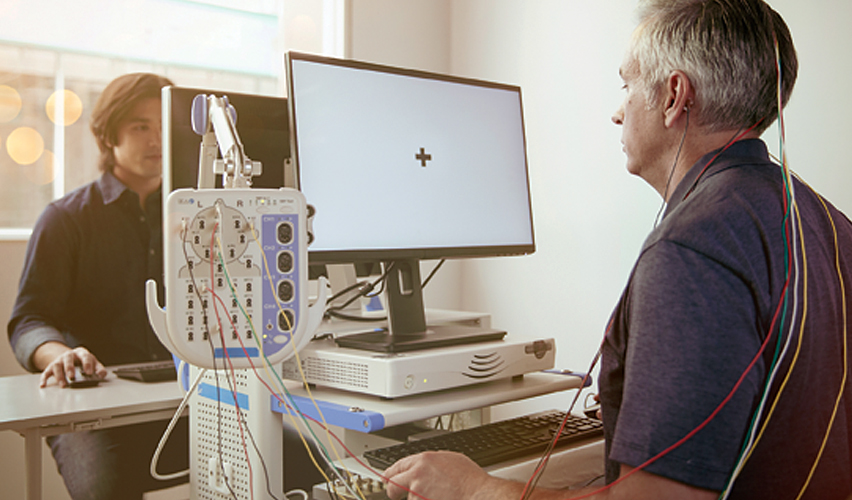Feature Story

VoxNeuro tech points to data-driven future of brain health
November 4, 2021
VoxNeuro is ready to change the way brain health is managed and treated across the globe. Today’s cognitive assessments are reliant on subjective measures like patient self-reporting and observed behaviour, opening the door for faulty results. The types of brain health assessments using objective measures that are available today, such as MRI or CT, only scan for structural issues (e.g. lesions in brain tissue, brain bleeds, or damage to the skull) and cannot provide an understanding of a brain’s cognitive health.
Enter VoxNeuro. The Canadian neuroscience and health tech company has developed a 30-minute, non-invasive Cognitive Health Assessment that uses electroencephalography (EEG) to record tens of thousands of data-points from a patient’s brain waves while they perform a series of tasks on a computer. The company’s medical software, the Cognitive Health Assessment Management Platform (CHAMP), then rapidly analyzes, transforms and compares the patient data to a database of healthy cognitive function. This is a procedure similar to that used with MRI and CT scans, which compares a patient’s brain structure to a healthy brain structure database. The result of VoxNeuro’s assessment is a report that objectively scores the patient’s cognitive function in the areas of attention and concentration, information processing, and memory.
When used as part of existing protocols to assess brain health, clinicians are now armed with a technology that provides them with a reliable report to support their clinical findings, decision making, and treatment of a patient’s condition. The addition of VoxNeuro’s technology makes an immediate impact, as clinicians are no longer forced to leverage patient self-reported symptoms or subjective measures of other observable behaviours in order to diagnose an issue. Instead, they can now accurately measure the neurophysiological health of a patient’s brain.
Dr. Abdel Kaleel is a neurologist and the owner of HeadworX Neurology Clinic in Kitchener, Ontario, one of five sites across southern Ontario where VoxNeuro’s technology is currently available to patients.
“VoxNeuro rounds out my practice very well and acts as an extension to our clinical exam, allowing us to develop a more realistic and complete picture of the patient’s road to recovery,” says Dr. Kaleel. “With the addition of VoxNeuro, our patients can feel very comfortable that we have the most current means of giving them a true understanding of their condition and a way to ensure their treatment is working.” He concludes, “With the objective data provided by VoxNeuro, we will be better able to determine if a patient’s cognitive concerns warrant further investigations or management options.”
With its success in southern Ontario, VoxNeuro now seeks to continue scaling across North America. This fall, the company launched in the USA through a network of diagnostic imaging centers in New York state. It will also soon be deploying at the first of many neurology clinics in the south-eastern United States where its assessment will become available in the next 12 months.
VoxNeuro plans to be operational in approximately 100 clinics in North America by the end of 2022.
As VoxNeuro continues to grow, so do its ambitions to improve cognitive health by taking brain healthcare into the future. Data-driven at its core, the company seeks to build the largest database in the world on neurophysiological measures of cognitive function. The database will fuel unprecedented insights that can be leveraged to improve patient diagnosis and treatment – a process that has already begun.
With the use of machine learning, VoxNeuro’s database has enabled the identification of neurophysiological biomarkers that reflect whether a patient who has suffered a concussion is experiencing a level of cognitive dysfunction that requires therapeutic rehabilitation. As the Cognitive Health Assessment becomes more widely used, its normative database will grow ever-larger. Machine learning will continue to be used to parcel out the key factors that affect brain health for certain conditions, such as dementia or Alzheimer’s, and to establish biomarkers that can help with early detection of these conditions.
VoxNeuro’s goal is to get to a point where its normative database reaches a scale that would enable personalized treatment, informed by a data set of comparable circumstances. The future of VoxNeuro’s work is to be able to identify the optimal treatment for individuals, depending on their specific situation and conditions, through continual collaboration with healthcare providers and systems and the use of machine learning. With the use of artificial intelligence, the company believes it may even be possible to administer therapeutics at specific moments where they’ll be most effective. For example, VoxNeuro’s scientists envision this being useful in identifying comatose patients on the verge of emerging. In this case, notifications could be sent to attending healthcare personnel that a particular patient’s prognosis is improving. Even information relevant to a patient’s chances of being rehabilitated after their emergence based on their cognitive state could be sent.
As brain health becomes more emphasized in healthcare, VoxNeuro aims to become an integral part of people’s lives. The company sees a future where its Cognitive Health Assessment can be incorporated into annual checkups to promote long-term well-being and prolonged quality of life, be integrated into pharmaceutical trials to add an objective data point and prove effectiveness, and be provided through remote healthcare services for enhanced and more convenient monitoring of brain health.
VoxNeuro is backed by 30+ years of globally celebrated, peer-reviewed scientific research, which has shown time and again that their technology has the speed, accuracy and objectivity to offer nearly limitless clinical applications.
As of this summer, VoxNeuro is an FDA Registered Medical Device Establishment, while their medical software, CHAMP, is listed as a Class II Exempt Medical Device in the USA and a Class II Medical Device in Canada.
